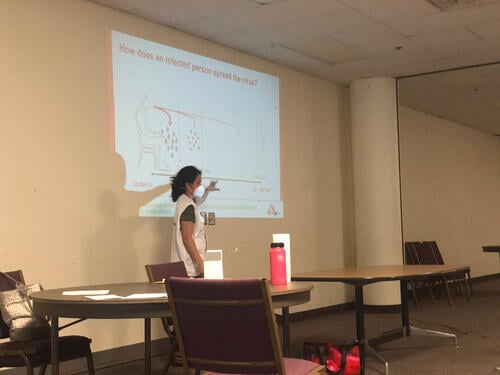Médecins Sans Frontières (MSF) is running COVID-19 health education and training on infection prevention and control (IPC) measures in nursing homes in the midwestern state of Michigan, United States, to help prevent the spread of the new coronavirus.
The United States remains a hot spot of the coronavirus pandemic, with more than 2 million confirmed cases of COVID-19, according to the World Health Organization. A crisis within a crisis has been unfolding in the country’s nursing homes and other long-term care facilities.
With such a heavy toll on the residents and the essential workers at these facilities, MSF has begun working in coordination with the Michigan Department of Health and Human Services and the Detroit Health Department to quickly identify which nursing home facilities are in need of infection control measures.
Nursing home residents and staff hard-hit by COVID-19
Earlier this month, the Michigan Department of Health and Human Services (MDHHS) released new COVID-19 data that recorded 66,000 confirmed cases and over 6,000 deaths. Nursing home residents accounted for 7,100 of the cases and, nearly 2,000 deaths. Additionally, more than 3,100 staff working in long-term care facilities have fallen ill from COVID-19.
In the state of Michigan, northeastern US:
6,000
6,
2,000
2,
3,100
3,1
“Much of the early focus during this outbreak has been on protecting hospitals from COVID-19, but what we see is that the virus has proven to be especially deadly for elderly people in nursing homes,” said Heather Pagano, emergency coordinator for MSF in Michigan. “We are providing hands-on, in-person training and guidance to staff to prevent the spread of COVID-19 in these facilities.”
“Feedback from the trainings has been especially positive from the non-medical staff – cleaning and kitchen workers – who are less likely to have previous training about the virus, how it spreads, and how to best protect themselves and others,” said Pagano.
The Wall Street Journal reported that deaths from COVID-19 among staff and residents in long-term care facilities represent over 40 per cent of all COVID-19 deaths in the US. Using data compiled by Johns Hopkins University, they estimate that over 50,000 such deaths had occurred so far.
Much of the early focus during this outbreak has been on protecting hospitals... but what we see is that the virus has proven to be especially deadly for elderly people in nursing homes.Heather Pagano, MSF emergency coordinator
MSF prioritising work in nursing homes
The situation in the US mirrors what MSF teams are seeing in other projects around the world. Older people have suffered the highest rates of death as a result of the pandemic. Elderly people living in long-term care facilities, or nursing homes, are at a heightened risk of infection and complications due to shared living spaces and underlying medical conditions.
In European countries, which were among the first that were hit hard as the pandemic spread worldwide, we have responded by prioritising IPC assistance to healthcare workers and staff in nursing homes to curb new infections and, by extension, reduce hospitalisation and preventable deaths among the elderly. These actions also help protect the staff who work in these facilities. MSF assisted the elderly and staff working in nursing homes in Belgium, France, Italy, Portugal, and Spain.
Our teams are bringing a similar approach to our work in the US with the launch of our COVID-19 project in Michigan. The team is offering three sets of activities to help protect residents and staff:
- assessments and general guidance to improve infection prevention and control practices;
- technical on-site support and training; and
- mental health workshops to address the high level of stress and grief that the frontline staff face every day.
Decision makers need to remain vigilant... and commit to developing and adhering to a comprehensive COVID-19 response plan that addresses racial health disparities.Heather Pagano, MSF emergency coordinator
“The emotional toll on the workforce has been immense,” said Pagano. “Every day, they face the full weight of working and caring for residents in an epidemic that doesn’t seem to have an end.”
“Some express their grief at having lost many residents – who they had long cared for – in a short period of time,” Pagano continued. “They also experience heightened stress and fear of bringing the virus home and infecting their family members.”
In Michigan, African Americans make up 14 per cent of the population, yet represent one-third of positive cases and 40 per cent of deaths, according to Michigan state health department. Racial health disparities in access to healthcare and health outcomes have been exacerbated by COVID-19, which is disproportionately affecting African-Americans.
“As the state begins reopening, in order to prevent new and severe infections, hospitalisations, and preventable deaths, decision makers need to remain vigilant,” said Pagano. “They need to commit to developing and adhering to a comprehensive COVID-19 response plan that addresses racial health disparities and supports facilities to address the problems of understaffing and increased workload, especially when personnel fall sick or have to self-isolate.”
In the United States, MSF has COVID-19 response teams working with migrant farmworkers in Florida; helping the homeless and housing insecure in New York City; working with organizations helping vulnerable communities in Puerto Rico; and supporting Native American communities in the Navajo Nation and Pueblos. In Michigan, MSF focuses on supporting staff in nursing homes and long-term care facilities housing the elderly. MSF has been running similar programs in care homes in Europe.



